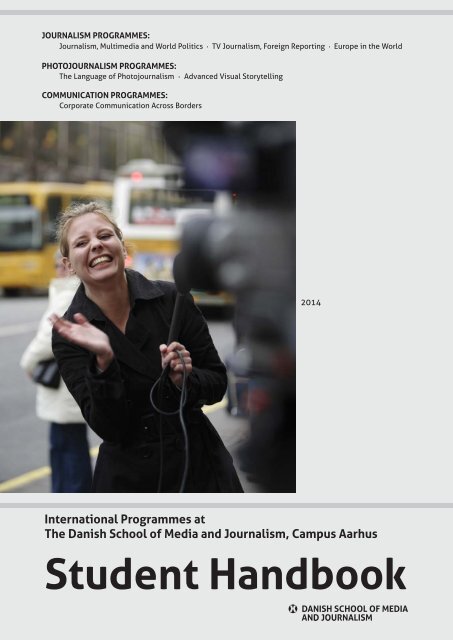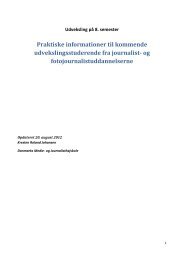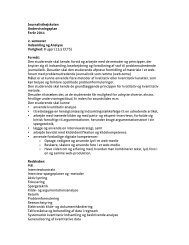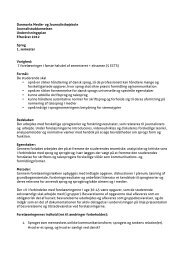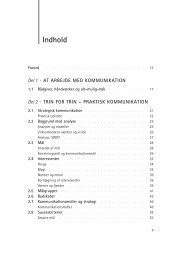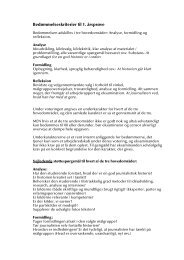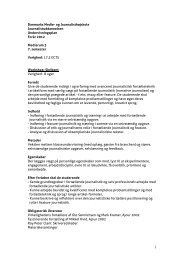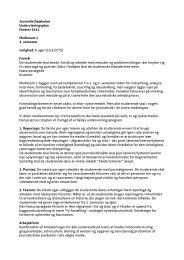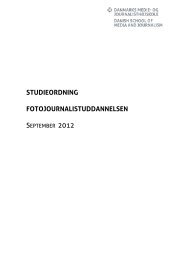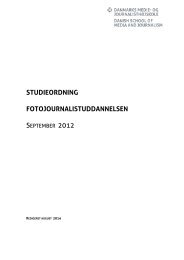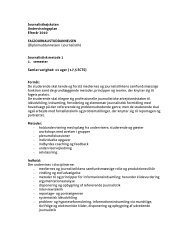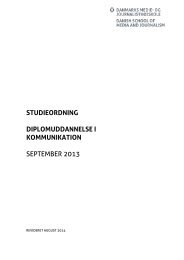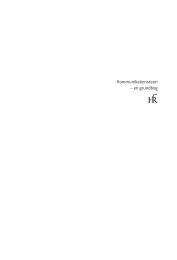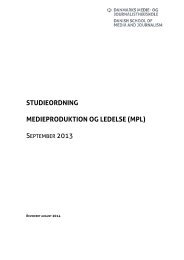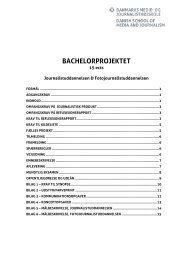Student Handbook
Student Handbook
Student Handbook
Create successful ePaper yourself
Turn your PDF publications into a flip-book with our unique Google optimized e-Paper software.
JOURNALISM PROGRAMMES:<br />
Journalism, Multimedia and World Politics . TV Journalism, Foreign Reporting . Europe in the World<br />
PHOTOJOURNALISM PROGRAMMES:<br />
The Language of Photojournalism . Advanced Visual Storytelling<br />
COMMUNICATION PROGRAMMES:<br />
Corporate Communication Across Borders<br />
2014<br />
International Programmes at<br />
The Danish School of Media and Journalism, Campus Aarhus<br />
<strong>Student</strong> <strong>Handbook</strong><br />
<strong>Student</strong> <strong>Handbook</strong> 2014 1
Content<br />
Welcome to the Danish School of Media and Journalism 3<br />
DMJX: Overview 4<br />
DMJX: Background 5<br />
School facilities 6<br />
Computers 6<br />
Email 6<br />
Library 6<br />
Access to DMJX evenings and weekends 6<br />
What we expect from you 7<br />
Comparative table of grading systems 8<br />
Registration upon arrival 10<br />
EU citizens 10<br />
Scandinavian citizens 10<br />
American, Canadian and other non EU citizens 10<br />
Living in Aarhus 11<br />
Housing 11<br />
Health Insurance 11<br />
Visit the GP (Doctor in general practise) 12<br />
Dentist 12<br />
Transportation in Aarhus 12<br />
Bicycles 12<br />
Social life 12<br />
More information 12<br />
Staff 14<br />
Danish language 16<br />
Graphic Design: Susanne Sommer & Henrik Meller. Photos: Jesper Voldgaard & Søren Pagter<br />
2 <strong>Student</strong> <strong>Handbook</strong> 2014
Welcome to the Danish School of Media<br />
and Journalism<br />
A warm welcome to the Danish School of Media<br />
and Journalism (DMJX) and a new international<br />
environment that hopefully will give you both<br />
professional and social challenges over the next<br />
semester. Our greatest satisfaction results from the<br />
evaluations when we see that students have moved<br />
to a higher understanding of both subject of study<br />
and themselves.<br />
DMJX has a variety of permanent staff and both<br />
national and international guest lecturers from<br />
the media. Furthermore, DMJX prioritize to have<br />
strategic partnerships with the best journalism<br />
schools around the world. In cooperation with<br />
strategic partners, DMJX is European coordinator<br />
for projects from EU programs like the EU-New<br />
Zealand and the Erasmus Mundus Programmes, and<br />
have a broad partnership with Erasmus bilateral<br />
agreements. These activities have helped to<br />
sponsor course development and the exchange of<br />
both teachers and students. The Nordic roots are<br />
developed through partnerships with journalism<br />
schools from the Nordic countries. We look forward<br />
to having you as a student for the next semester,<br />
and hope you will grab the opportunity to be part<br />
of a both national and international environment,<br />
and form a network which will be a benefit for your<br />
future life as a journalist or within communication,<br />
being part of a strong alumni after you have left<br />
DMJX.<br />
As we hopefully contribute to your process of<br />
getting a better understanding of journalism and<br />
communication in an international environment,<br />
we do hope you will contribute to the ongoing<br />
process of maintaining the high quality<br />
international journalism education at DMJX.<br />
A Warm Welcome from<br />
Anna Nejrup, International coordinator<br />
incoming students Aarhus<br />
Inger Munk, Head of International Department<br />
The international programs covered by<br />
this handbook are the following:<br />
Journalism, Multimedia and World Politics: The<br />
semester in Denmark combines journalistic training<br />
with intensive study. In the course of an intensive<br />
one-semester program you do international<br />
reporting, EU reporting, learn about risk reporting<br />
and expand your view on world politics. The work<br />
concludes in a multi-media production based on a<br />
research travel in or outside Denmark.<br />
Undergraduate class of max 26 students from<br />
Denmark, Europe and the rest of the world.<br />
TV Journalism, Foreign Reporting: An intensive<br />
semester class which combines practical<br />
TV-journalistic training with theoretical studies.<br />
You will produce sharply angled journalism stories<br />
in the style of “Foreign correspondent reporting”.<br />
In addition you will acquire analytical skills of<br />
TV/video stories through use of academic theory<br />
and approaches. You will reflect upon journalism<br />
activity in general and according to your own<br />
practice, including ethical and professional<br />
dilemmas. You will foster skills in inclusive<br />
journalism and develop a critical understanding<br />
of the relevant social and media structures in the<br />
World, and gain knowledge on contemporary world<br />
politics and focus on the major historical changes in<br />
the world, and specific in Europe.<br />
We have one of the best educational and training<br />
facilities for TV-journalism in Europe, with for<br />
example exclusive access to shooting and editing<br />
facilities throughout the course.<br />
Upper level class of max 21 students from Denmark,<br />
Europe and the rest of the world.<br />
The Language of Photojournalism: The semester<br />
in Denmark offers you a chance to combine<br />
photo journalistic training with intensive<br />
study. The program focuses on the language of<br />
photojournalism combined with the journalistic<br />
disciplines like writing and adding sound to<br />
pictures. Under graduate class of max 8 - 10<br />
students from Europe and the rest of the world.<br />
Advanced Visual Storytelling: This advanced photojournalism<br />
semester offers you a chance to study in<br />
Denmark together with a class of Danish students<br />
<strong>Student</strong> <strong>Handbook</strong> 2014 3
of photojournalism. The Danish students attending<br />
this program are at their final semester of a<br />
four-year study. The group seize is max 16 students.<br />
Europe in the World: A one-year specialization in<br />
European affairs and how to report it. Starting every<br />
September with four months in Utrecht, NL where a<br />
foundation is built in European history, regional<br />
economics, EU institutions and EU politics. The<br />
students finish with five months in Denmark where<br />
the focus is foreign policy and analytical journa lism.<br />
The work concludes in a multimedia production<br />
for the web magazine Euroviews and a final exam<br />
project. <strong>Student</strong>s may obtain an Europe in the World<br />
Diploma and an additional honors diploma.<br />
Upper level class of 20 students from Denmark,<br />
Europe and the rest of the world.<br />
Corporate Communication Across Borders:<br />
Offered autumn semesters.<br />
This semester presents various perspectives of<br />
Corporate Communication and combines<br />
theoretical insights with enterprise practices.<br />
<strong>Student</strong>s will be presented to a broad range<br />
of corporate communication disciplines, and<br />
will get insight into how selected international<br />
companies deal with disciplines such as cross<br />
cultural communication, reputation management<br />
and corporate social responsibility. Companies<br />
are bounded by economy, society and politics as<br />
conditions for doing business, and students get an<br />
insight in why and how companies deal with these<br />
challenges in practice.<br />
Advanced undergraduate level class of 50 Danish<br />
and international students. Participants have<br />
studied Communication for at least two years.<br />
Mentor arrangement<br />
Each semester, we arrange with 3-4 Danish students<br />
that they will be your mentor team. They will be<br />
able to answer questions you might have regarding<br />
your arrival. They will meet you when you arrive in<br />
Aarhus, give you your key to your new address,<br />
help you get settled and arrange some social events<br />
during your first time here in Aarhus.<br />
The mentors take contact to You shortly after you<br />
have been admitted to the semester programme,<br />
and arrange a facebook group, so you may be<br />
in contact with the mentors and your fellow<br />
international students.<br />
DMJX: Overview<br />
The Danish School of Media and Journalism<br />
covers the whole media sector offering a wide range<br />
of bachelor’s and master’s degrees, diplomas and<br />
further education in journalism, photo journalism,<br />
communication, design, media management etc.<br />
Currently, more than 1900 full time students are<br />
enrolled and almost 4000 course participants enroll<br />
in further education on a yearly basis.<br />
DMJX has about 170 full time employees.<br />
DMJX is a state institution with its own ministerial<br />
law: “Law on The Danish School of Media and<br />
Journalism”. It is governed by a board, who appoints<br />
a rector who is in charge of the day to day running<br />
of DMJX concerning staff, administration and<br />
economy.<br />
Current rector is Jens Otto Kjær Hansen.<br />
Rector Jens Otto Kjær Hansen<br />
4 <strong>Student</strong> <strong>Handbook</strong> 2014
DMJX: Background<br />
A historical scribe<br />
• The Danish School of Media and Journalism was<br />
formed in 2008 by a merger between<br />
• The Danish School of Journalism<br />
• UPDATE<br />
• The Graphics Art Institute of Denmark<br />
The merger of the three educational establishments<br />
means that the school now covers the whole media<br />
sector and provides design and content to the media<br />
industry, as well as giving students and teachers the<br />
opportunity to exchange knowledge and experience<br />
of the media sector across specialist groups.<br />
The Danish School of Journalism<br />
The first Danish journalism course was established<br />
as part of Aarhus University in 1946. In 1971,<br />
Danmarks Journalisthøjskole (the Danish School of<br />
Journalism) was established as a free standing<br />
institution doing research and teaching at the<br />
undergraduate level offering a BA in Journalism.<br />
In 1992, the four year BA course of photojournalism<br />
was started. Part of this course is taught together<br />
with the BA in journalism.<br />
Both journalism and photojournalism have been<br />
internationally oriented for a long time. The very first<br />
international program, ” Europe in the World”, was<br />
launched in 1990, and have been followed by five<br />
international semester programmes in journalism,<br />
photo journa lism, and corporate communication.<br />
In 2004 the Danish School of Journalism in<br />
cooperation with Aarhus University and four<br />
European Universities was granted the Erasmus<br />
Mundus Masters stamp with the Erasmus Mundus<br />
Masters Journalism, Media and Globalization.<br />
This global start was followed by two national<br />
masters courses in journalism offered by the Danish<br />
School of Journalism and Aarhus University with the<br />
degree issued by Aarhus University.<br />
In 2011 a BA education in Corporate Communication<br />
was offered to start 2011 in Aarhus and 2013<br />
in Copenhagen.<br />
UPDATE<br />
Established in 2007 as Northern Europe’s largest<br />
centre for journalism training and skills with over<br />
100 training courses and other events offered each<br />
semester.<br />
The same year, UPDATE entered into a strategic<br />
alliance with the leading training establishment in<br />
the USA; the Poynter Institute in Florida, and runs<br />
the first Poynter summer school under UPDATE’s<br />
management.<br />
Further studies and training are offered both in<br />
Copenhagen and in Aarhus.<br />
The Graphics Art Institute of Denmark<br />
Founded in 1943 with the objective of creating a<br />
theoretical education for future graphic managers.<br />
For many years, its training courses have been<br />
focussed on economics and technology, but since<br />
the 1990s digital and print media have played a<br />
larger part in the training which has today<br />
developed into the existing Bachelor degrees in<br />
Media Production and Management.<br />
In 1956, a new stream was launched: Special<br />
studies in Graphic Design. The special study course<br />
puts most initial emphasis on book presentation,<br />
but moves on to include many other graphic design<br />
processes in both print and digital media. Over the<br />
years, the course has developed into a Bachelor<br />
degree course in Graphic Communications.<br />
At the suggestion of the TV and media industries,<br />
the Bachelor course in TV and Media Planning was<br />
added to the school’s full-time courses in 2006.<br />
In order to meet the increasing need for specialist<br />
staff in the media industry, Graphic Communications<br />
was divided into three streams in 2007:<br />
Graphic Design, Interactive Design and Creative<br />
Communication. A new BA course in photographic<br />
Communication was launched in 2012, and the BA<br />
course in Corporate Communication was launched<br />
in Copenhagen in 2013.<br />
<strong>Student</strong> <strong>Handbook</strong> 2014 5
School facilities<br />
Computers<br />
<strong>Student</strong>s use the school´s computers (Mac computers).<br />
<strong>Student</strong>s who prefer to work on their own<br />
computers are able use the school´s free wireless<br />
network.<br />
Email<br />
All students are granted an email address at the<br />
school, to be used during their stay in Aarhus.<br />
The email address is needed in order to make<br />
printouts and to get access to school computers<br />
and the wireless network. Official messages are<br />
sent to this email address.<br />
The DMJX-email is closed one month after the<br />
course has ended.<br />
Access to DMJX evenings and weekends<br />
If you want to work late or during weekends at<br />
DMJX, you need access cards. A special card is<br />
required for each department – Graphic<br />
Department, Television and Radio Department.<br />
A 200 DKK deposit is required.<br />
You can get hold of an access card to the Graphic<br />
Department by sending an email to ss@dmjx.dk or<br />
hm@dmjx.dk and make an appointment . You are<br />
required to show your study-card when applying.<br />
An access-card to the Television department can be<br />
acquired in the Television technicians’ office 060<br />
anytime during teaching hours. An access-card to<br />
the Radio department can be acquired in office 503<br />
Monday-Friday from 9.00-14.00.<br />
Library<br />
The school library and the Danish Media Archives<br />
are at your disposal. There are a variety of<br />
international papers and magazines. There are also<br />
computers specially set up for international wire<br />
services and databases. The Danish State<br />
and University library at the Aarhus University is<br />
open for use if you have a Danish social security<br />
number (CPR number) You may, however, always<br />
order books through the DMJX library.<br />
6 <strong>Student</strong> <strong>Handbook</strong> 2014
What we expect from you<br />
The Basics<br />
We strive to provide you with high quality,<br />
dedicated teaching in the DMJX international<br />
programmes. The rules and the procedures that<br />
govern the Danish students at DMJX also apply to<br />
the international students:<br />
In particular we call your attention to the following<br />
facts:<br />
• Be punctual in class. Classes start on time.<br />
• Inform the teacher if you are not able to come<br />
to class, and if you are ill.<br />
• Respect deadlines.<br />
• If students fail to submit work by a deadline<br />
without first requesting permission for an<br />
extension and being granted an extension, the<br />
work will not be accepted and the result will be<br />
a fail.<br />
• Observe the program policy and the rules on<br />
plagiarism and fabrication.<br />
• Bear in mind that sources, experts or people<br />
that you interview should be treated cordially<br />
and respectfully. You should honour any<br />
promises made to them.<br />
Program Policy<br />
We strive at the Danish School of Media<br />
and Journalism to uphold the standards of<br />
excellence in Journalism.<br />
We require the students to uphold the IJF standards<br />
of journalism in all their work:<br />
The IFJ Declaration of Principles on the conduct of<br />
journalists:<br />
“This international declaration is proclaimed as a<br />
standard of professional conduct for journalists<br />
engaged in gathering, transmitting, disseminating<br />
and commenting on news and information in<br />
describing events.<br />
1. Respect for truth and for the right of the public<br />
to truth is the first duty of the journalist.<br />
2. In pursuance of this duty, the journalist shall at<br />
all times defend the principles of freedom in<br />
the honest collection and publication of news,<br />
and of the right of fair comment and criticism.<br />
3. The journalist shall report only in accordance<br />
with facts of which he/she knows the origin.<br />
The journalist shall not suppress essential<br />
information or falsify documents.<br />
4. The journalist shall use only fair methods to<br />
obtain news, photographs and documents.<br />
5. The journalist shall do the utmost to rectify<br />
any published information which is found to be<br />
harmfully inaccurate.<br />
6. The journalist shall observe professional<br />
secrecy regarding the source of information<br />
obtained in confidence.<br />
7. The journalist shall be aware of the danger of<br />
discrimination being furthered by the media,<br />
and shall do the utmost to avoid facilitating<br />
such discrimination based on, among other<br />
things, race, sex, sexual orientation, language,<br />
religion, political or other opinions, and<br />
national or social origins.<br />
8. The journalist shall regard as grave professional<br />
offences the following:<br />
• plagiarism;<br />
• malicious misrepresentation;<br />
• calumny, slander, libel, unfounded<br />
accusations;<br />
• acceptance of a bribe in any form in<br />
consideration of either publication or<br />
suppression.<br />
9. Journalists worthy of the name shall deem it<br />
their duty to observe faithfully the principles<br />
stated above. Within the general laws of each<br />
country the journalist shall recognise in professional<br />
matters the jurisdiction of colleagues<br />
only, to the exclusion of every kind of interference<br />
by governments or others.<br />
(Adopted by the 1954 World Congress of the IFJ.<br />
Amended by the 1986 World Congress.)<br />
When submitting your student work, be aware that<br />
plagiarism is presenting someone else’s words,<br />
images or other work as your own without credit or<br />
attribution. This includes quoting without proper<br />
attribution.<br />
Be aware that fabrication in the form of deliberately<br />
using bogus information is an act of dishonesty.<br />
Be aware that violations of the basic rules of<br />
journalism will result in failing the course where<br />
the violation occurs or in expulsion from the<br />
program. Written assignments are being checked by<br />
the plagiarism detection system Urkund.<br />
If you are in doubt consult your teacher.<br />
<strong>Student</strong> <strong>Handbook</strong> 2014 7
Comparative table of grading systems<br />
The Danish 7-point marking scale * ECTS grade ** US grade<br />
12<br />
For an excellent presentation that demonstrates a high level<br />
of command of all aspects of the relevant material and<br />
containing no or only few minor weaknesses.<br />
A<br />
A+<br />
10<br />
For a very good presentation that demonstrates a high level of<br />
command of most aspects of the relevant material and<br />
containing only minor weaknesses.<br />
B<br />
A<br />
7<br />
For a good presentation that demonstrates good command of<br />
the relevant material but containing some weaknesses.<br />
C<br />
B<br />
4<br />
For a fair presentation that demonstrates some command of<br />
the relevant material but containing some major weaknesses.<br />
D<br />
C<br />
02<br />
For a presentation meeting only the minimum<br />
requirements for acceptance.<br />
E<br />
D<br />
00<br />
For a presentation not meeting the minimum<br />
requirements for acceptance.<br />
FX<br />
F<br />
-3<br />
For a presentation that is unacceptable in all<br />
respects.<br />
F<br />
F-<br />
* ECTS: European Credit Transfer System<br />
** US grade is compared with www.discoverAbroad.com<br />
Study Rules<br />
Our international courses are centered around<br />
production. You will have lectures, literature and<br />
evaluation sessions, but most of your time will<br />
be spent outside the classroom in some phase of<br />
production. Theory, therefore, is doubly matched<br />
with practice. It is “learning-by-doing.”<br />
Your attendance is expected at all lectures and<br />
evaluations and your participation is expected in<br />
the production of all assignments.<br />
Grading<br />
All international courses are full course load<br />
semester programs run in English. The journalism<br />
courses are designed for students with a background<br />
in journalism understanding the basic concepts of<br />
angle, source management and documentation.<br />
Some courses are graded passed/not passed. Some<br />
courses are graded by the Danish grading system;<br />
please see the conversion table for ECTS and US<br />
equivalents. If grades are needed, all courses may<br />
be graded; this requires that an agreement on this is<br />
made in advance with the international office contact<br />
anna@dmjx.dk. <strong>Student</strong>s’ activities are graded based<br />
on active attendance at lectures, preparation for the<br />
lectures, participation in group work, written and<br />
other assignments, punctuality and in some cases<br />
examinations.<br />
Workshop teachers may ask students to redo,<br />
correct or adjust specific tasks or assignments in<br />
case of these being insufficient.<br />
No student who has received a passing mark for an<br />
assignment will be permitted to resubmit in order<br />
to gain a better result; the first result stands.<br />
Each student has three chances to obtain a passing<br />
mark for each course. Special regulations apply for<br />
the final project.<br />
Attendance<br />
Due to the working style at the Danish School<br />
of Media and Journalism where group work and<br />
coaching have a high priority, students are expected<br />
to attend all classes. If you for some reason cannot<br />
come, you must call the Danish School of Media and<br />
Journalism. In order to pass a course you must in<br />
principle attend all classes. Exceptions can be made<br />
if you show a medical certificate and/or you make<br />
an arrangement with the teacher.<br />
Phone<br />
We expect that you have a mobile phone when<br />
you arrive, and that you buy phone cards for your<br />
mobile upon arrival. The mobile is an important part<br />
of your journalistic equipment. For long distance<br />
calls, we advise students to buy global cards/other<br />
cards and/or use Skype.<br />
8 <strong>Student</strong> <strong>Handbook</strong> 2014
<strong>Student</strong> <strong>Handbook</strong> 2014 9
Registration upon arrival<br />
All international students must register at a civil<br />
authority.<br />
We expect everyone to register within the first<br />
couple of days after your arrival. There are different<br />
procedures for EU and non EU students.<br />
EU citizens<br />
Go to Statsforvaltningen Midtjylland, Afdelingskontor<br />
Aarhus, Lyseng Allé 1, 8270 Højbjerg. Fill<br />
out an application form (included in your welcome<br />
package), bring the letter from DMJX stating the<br />
Erasmus/Socrates period (also included in your<br />
welcome package) and bring your passport and<br />
2 photos. They will give you a residence permit.<br />
Opening hours: Statsforvaltningen Midtjylland<br />
Monday, Tuesday, Wednesday from 09:00-15:00<br />
Thursday from 09:00-17:00<br />
Friday from 09.00-12:00<br />
When you have received your residence permit<br />
from Statsforvaltningen Midtjylland, you bring this<br />
permit to the Borgerservice, Rådhuset (city Hall),<br />
Tårnindgangen, Park Allé, 8000 Aarhus C. They will<br />
give you a CPR number. Remember to bring your<br />
passport.<br />
Opening hours: Borgerservice, Rådhuset<br />
Monday, Tuesday, Wednesday,<br />
Friday from 09:00-16:00<br />
Thursday from 10:00-18:00<br />
Scandinavian citizens<br />
Go directly to the Borgerservice, Rådhuset (city<br />
Hall), Tårnindgangen, Park Allé, 8000 Aarhus C.<br />
Bring your passport, and they will give you a CPR<br />
number.<br />
Opening hours: Borgerservice, Rådhuset<br />
Monday, Tuesday, Wednesday,<br />
Friday from 09:00-16:00<br />
Thursday from 10:00-18:00<br />
American, Canadian and other non EU citizens<br />
You should go to the Borgerservice, Rådhuset (city<br />
Hall), Tårnindgangen, Park Allé, 8000 Aarhus C<br />
within 5 days in order to receive your CPR number<br />
and be covered by the Danish social securitysystem.<br />
You will need to bring your residence permit letter<br />
and your passport. You will automatically receive<br />
your residence permit (residence card type Z) by<br />
mail within approximately 4 weeks after registering<br />
with the local authorities. Please remember to write<br />
your full name on your mail box. Please contact us if<br />
you don’t receive your residence card.<br />
Opening hours: Borgerservice, Rådhuset<br />
Monday, Tuesday, Wednesday,<br />
Friday from 09:00-16:00<br />
Thursday from 10:00-18:00<br />
Other uses of CPR card<br />
The “CPR-card” is not only of value when it comes<br />
to health insurance. It makes it easier for you to<br />
open a bank account and receive a library card for<br />
the State Library in Aarhus.<br />
And you might be asked to show it when entering<br />
some of the night-clubs and discos.<br />
10 <strong>Student</strong> <strong>Handbook</strong> 2014
Living in Aarhus<br />
Housing<br />
It is hard to find housing in Aarhus. The Danish<br />
School of Media and Journalism is cooperating<br />
very closely with the Aarhus Municipality office for<br />
<strong>Student</strong> Housing (Kollegiekontoret) and the places<br />
international students are staying are distributed<br />
by Kollegiekontoret. Please respect the rules at the<br />
places, so DMJX is able to maintain the good<br />
relationship to these dormitories and future<br />
international students can stay there as well.<br />
Each rent is paid by you at a local post office, at any<br />
bank or by internet-banking. You will receive a bill<br />
in your room each month. Rents are paid in advance<br />
at the beginning of the month.<br />
Please bear in mind that it is your own<br />
responsibility to make sure that the rent is paid on<br />
time. If you fail to pay the rent before the 3rd<br />
working day, the local housing administration<br />
office (Kollegiekontoret) will charge you a late fee<br />
of about 200 DKK.<br />
You are expected to keep your room clean and in<br />
an acceptable condition. You will also have joint<br />
responsibility for the maintenance of shared facilities<br />
such as the kitchen and common rooms. Lack in<br />
maintenance and cleaning of your room will result<br />
in heavy deductions from your deposit. Approximately<br />
2 months after you have moved out of your<br />
room, the deposit will be sent to you according to<br />
your own instructions.<br />
Please note that most of the dormitories require<br />
students to move out 7 working days before the end<br />
of the last month of your lease-agreement.<br />
Most students´ residences are not located in the<br />
city centre, but the bus connections and bicycle<br />
paths in Aarhus are quite good. Private rooms tend<br />
to be more centrally located.<br />
Living with Danish students is a good way to learn<br />
something about the local culture and perhaps even<br />
a little Danish. Danes can be a little reserved, so be<br />
prepared to take the first step when getting to know<br />
your neighbours. You will soon find out that Danes<br />
are usually easy-going and quite friendly. Every<br />
dorm has its own house rules – please follow them.<br />
If you have any questions, you are welcome to ask<br />
your neighbours how things work at your dorm.<br />
Health Insurance<br />
You need to buy a health insurance to cover you<br />
during the first 7 weeks after your arrival and<br />
registration. It will take 5-6 weeks for you to get a<br />
card with your Personal Registration Number (CPRnumber)<br />
after you have registered. When you get it<br />
you are eligible to receive health benefits and are<br />
covered by the Danish health insurance system.<br />
<strong>Student</strong> <strong>Handbook</strong> 2014 11
Visit the GP (Doctor in general practise)<br />
With the CPR card, visits to the GP, any eye or earspecialist<br />
as well as any hospitalisation in a public<br />
hospital are free. When getting your CPR-number<br />
you choose a GP/Family doctor you can contact if<br />
you fall ill, need prescriptions, vaccinations etc.<br />
Please be aware that you need to make an appointment<br />
before going to your GP and you must pay for<br />
all medicine, inclu_ding prescribed medicine.<br />
Contact Out-of-hours medical service if you need to<br />
see a doctor outside your own GP’s opening hours.<br />
Out-of-hours medical service is open from 16.00-<br />
08.00 Monday – Friday and 24 hours at weekends<br />
and bank holidays. Call +45 7011 3131 for Out-ofhours<br />
medical service to make an appointment.<br />
Dentist<br />
Dental costs are only partly covered by the Danish<br />
health insurance system.<br />
Transportation in Aarhus<br />
The bus system in Aarhus is very efficient. Bus lines<br />
to the city centre have bus stops right outside the<br />
DMJX. Bus timetables can be bought in the kiosks<br />
in town or you can find them on Midttrafik’s webpage:<br />
http://www.midttrafik.dk/in-english.aspx<br />
Ten trip cards can be obtained in any kiosk.<br />
Buy your bus pass or Aarhus Card here:<br />
Midttrafik Kundecenter (Customer Service)<br />
Aarhus Bus Station<br />
Fredensgade 45<br />
8000 Aarhus C<br />
Open monday to sonday 7.00 AM to 11.00 PM.<br />
Phone: 70 210 230<br />
Bicycles<br />
It is possible to look for a second-hand bike for sale<br />
in the classifieds of the local newspapers such as<br />
Aarhus Onsdag, which is delivered free of charge to<br />
all households on Wednesdays.<br />
Alternatively, you can purchase a bike through<br />
Østjysk Auktion (http://oj-auktion.dk). Auctions<br />
are held at Kringelled 6, 8250 Egå. It is possible to<br />
have the auction conducted in English but please<br />
remember to ask Østjysk Auktion a couple of days<br />
before the auction. You have to pay what you bid<br />
plus an auctioneer’s fee.<br />
You can also choose to use the public bikes. They<br />
are to be found all over town maybe used for<br />
a 20 DDK deposit<br />
Social life<br />
Friday Bar<br />
<strong>Student</strong>s at the Danish School of Media and<br />
Journalism have their own bar. It is situated in the<br />
school basement and is open every Friday from<br />
14.15 until 24.00.<br />
The bar is managed by student volunteers. In the<br />
beginning of each semester new volunteers are<br />
looked for. Approximately ten are required and<br />
international students are welcome.<br />
School parties<br />
The Danish School of Media and Journalism<br />
arranges two big school parties every semester.<br />
They are held in the school canteen and are very<br />
popular.<br />
<strong>Student</strong>erhus Aarhus (The <strong>Student</strong> House)<br />
During the first week of introduction, international<br />
students get introduced to <strong>Student</strong>erhus Aarhus<br />
and the Association of Erasmus <strong>Student</strong>s.<br />
<strong>Student</strong>erhus Aarhus is the meeting place for<br />
foreign students and Danes. It is a place where you<br />
can relax when you are not studying or working.<br />
It has years of experience in organising social<br />
activities, advising and providing practical<br />
information to foreigners living in Denmark. It is a<br />
non-profit, non-religious and non-political<br />
organisation. The aim of the student house is to<br />
promote international understanding by providing<br />
a relaxed atmosphere for social and cultural<br />
interaction and exchange.<br />
See more on www.studenterhusaarhus.dk.<br />
More information<br />
For more information on being an international<br />
student in Aarhus and Denmark, please visit:<br />
http://www.denmark.dk/en<br />
for a general information about Denmark.<br />
http://www.kl.dk/English/<br />
about the Danish Local Government System<br />
http://www.aarhus.dk/da/omkommunen/english.<br />
aspx and www.businessregionaarhus.com<br />
for general information about Aarhus.<br />
12 <strong>Student</strong> <strong>Handbook</strong> 2014
<strong>Student</strong> <strong>Handbook</strong> 2014 13
Staff<br />
Journalism, Multimedia and<br />
World Politics: Journalism Teachers<br />
The Photojournalism Courses:<br />
Photojournalism Teachers<br />
John Frølich, Ass. professor<br />
jf2@dmjx.dk, Journalist,<br />
the Danish School of Journalism.<br />
Diploma Course in foreign news reporting.<br />
European Studies at Aarhus University.<br />
Søren Pagter, Ass. Professor,<br />
Head of Photo Department<br />
sp@dmjx.dk, Press photographer,<br />
the Danish School of Journalism<br />
Asbjørn Slot Jørgensen,<br />
Ass. professor<br />
asbo@dmjx.dk, Journalist,<br />
The Danish School of Journalism<br />
Mads Greve, Ass. Professor<br />
mg@dmjx.dk, Photojournalist,<br />
the Danish School of Journalism<br />
Europe in the World: Journalism Teachers<br />
Øjvind Kyrø,<br />
Freelance journalist and author<br />
kyroe@city.dk, Journalist, The Danish School of<br />
Journalism, exam. art Religion<br />
Asbjørn Slot Jørgensen,<br />
Ass. Professor<br />
asbo@dmjx.dk, Journalist,<br />
The Danish School of Journalism<br />
Hans-Henrik Holm,<br />
Jean Monnet Professor<br />
and Professor of World Politics<br />
hhh@dmjx.dk, Political science.<br />
Guest Professor at various<br />
international universities<br />
14 <strong>Student</strong> <strong>Handbook</strong> 2014
Technical Teachers<br />
International Department<br />
Susanne Sommer, Graphic designer<br />
ss@dmjx.dk, Graphic designer<br />
Inger Munk, Head of Department,<br />
Coordinator International programs<br />
imu@dmjx.dk,<br />
MSc. Geography, Aarhus University<br />
Henrik Meller, Graphic designer<br />
hm@dmjx.dk, Graphic designer<br />
Anna Nejrup,<br />
International Coordinator,<br />
incoming students<br />
anna@dmjx.dk, MA in French and English,<br />
Aarhus School of Business<br />
Chester Folming,<br />
Relationship Manager<br />
cf@dmjx.dk, Multimedia Designer,<br />
Aarhus Business College<br />
Kresten Roland Johansen,<br />
Project Manager and<br />
International Coordinator,<br />
outgoing students<br />
krj@dmjx.dk, MA in History of Ideas and<br />
Political Science, Aarhus University<br />
Hans Bromand Nørgård,<br />
TV Technician<br />
hbn@dmjx.dk, TV Technician<br />
tf@dmjx.dk<br />
Tom Fangel,<br />
Technical Lecturer<br />
Alice Høier, Radio Technician<br />
alh@dmjx.dk, Radio Technician<br />
<strong>Student</strong> <strong>Handbook</strong> 2014 15
Danish language<br />
Courses are offered for free by lærdansk<br />
(www.laerdansk.dk) and introduced during<br />
the introduction week.<br />
Teach yourself Danish - online<br />
Free of charge<br />
Dansk nu – make a log-in and then you can use<br />
• Historien om Peter (the story about Peter)<br />
• Spil (games)<br />
• Udtale (pronunciation)<br />
http://www.dansk.nu<br />
With a fee<br />
Speak Danish: www.speakdanish.dk<br />
Short language guide<br />
Danish<br />
Food shopping<br />
English<br />
Drikkevarer<br />
Te<br />
Kaffe<br />
Øl<br />
Sodavand<br />
Saft (Juice)<br />
Kildevand<br />
Vand<br />
Pålæg<br />
Skinke<br />
Spegepølse<br />
Leverpostej<br />
Ost<br />
Gedeost<br />
Kød & Fjerkræ<br />
Beverages<br />
Tea<br />
Coffee<br />
Bear<br />
Soft drink<br />
Juice<br />
Spring water<br />
Plain water or tap water<br />
Cold cuts/spread<br />
Ham (pork)<br />
Salty sausage<br />
(pork, beef and lam)<br />
Liver paste (pork)<br />
Cheese<br />
Goat cheese<br />
Meat & Poultry<br />
Brød<br />
Franskbrød<br />
Rygbrød<br />
Grovbrød<br />
Boller<br />
Rundstykker<br />
Wienerbrød<br />
Kiks<br />
Småkager<br />
Bread<br />
White bread<br />
Rye bread<br />
Brown bread<br />
Buns<br />
Rolls<br />
Danish pastry<br />
Biscuits (non sweet)<br />
Cookies (sweet)<br />
Oksekød<br />
Hakket oksekød<br />
Kalvekød<br />
Svinekød<br />
Hakket kalv & flæsk<br />
Lammekød<br />
Lammekølle<br />
Kylling<br />
Kalkun<br />
Hakket kalkun<br />
Beef<br />
Minced beef<br />
Veal<br />
Pork<br />
Minced pork & veal<br />
Lamb<br />
Leg of lamb<br />
Chicken<br />
Turkey<br />
Minced turkey<br />
Mejeri produkter<br />
Mælk<br />
Sødmælk<br />
Letmælk<br />
Skummetmælk<br />
Mini mælk<br />
Kærnemælk<br />
Kaffefløde<br />
Piskefløde<br />
Yoghurt<br />
A 38<br />
Creme fraiche<br />
Tykmælk<br />
Smør<br />
Margarine<br />
Plantemargerine<br />
Dairy products<br />
Milk<br />
Whole milk<br />
Semi-skimmed milk<br />
Skimmed milk<br />
Low fat milk<br />
Buttermilk<br />
Cream<br />
Double cream<br />
Yoghurt<br />
Sourmilk<br />
Soured cream<br />
Junket<br />
Butter<br />
Margerine<br />
Vegetable margerine<br />
Frugt & grønt<br />
Appelsin<br />
Æble<br />
Pære<br />
Banan<br />
Grapefrugt<br />
Druer<br />
Tomat<br />
Agurk<br />
Salat<br />
Spinat<br />
Kartofler<br />
Gulerødder<br />
Løg<br />
Hvidløg<br />
Fruit & vegetables<br />
Orange<br />
Apple<br />
Pear<br />
Banana<br />
Grapefruit<br />
Grapes<br />
Tomato<br />
Cucumber<br />
Lettuce<br />
Spinach<br />
Irish potatoes<br />
Carrots<br />
Onion<br />
Garlic<br />
16 <strong>Student</strong> <strong>Handbook</strong> 2014
Ærter<br />
Bønner<br />
Champignon<br />
Blomkål<br />
Hvidkål<br />
Peas<br />
Beans<br />
Mushroom<br />
Cauliflower<br />
Cabbage<br />
Paprika<br />
Kardemomme<br />
Vanille<br />
Sanitation<br />
Paprika<br />
Cardamon<br />
Vanilla<br />
Fisk<br />
Tun<br />
Laks<br />
Torsk<br />
Rødspætte<br />
Ørred<br />
Rejer<br />
Krabber<br />
Fish<br />
Tuna<br />
Salmon<br />
Cod<br />
Plaice<br />
Trout<br />
Shrimps<br />
Crabs<br />
Sæbe<br />
Vaskepulver<br />
WC-rens<br />
Opvaskemiddel<br />
Tandpasta<br />
Tandtråd<br />
Tandstikker<br />
Tandbørste<br />
Frisør<br />
Svømmehal<br />
Soap<br />
Washing powder<br />
Toilet bowl cleaner<br />
Dish washing liquid<br />
Toothpaste<br />
Dental floss<br />
Toothpicks<br />
Toothbrush<br />
Hairdresser<br />
Swimming baths<br />
Pasta etc.<br />
Pasta<br />
Nudler<br />
Hvedemel<br />
Ris<br />
Rismel<br />
Majs<br />
Majsmel (Maizena)<br />
Pasta etc.<br />
Pasta<br />
Noodles<br />
Flour<br />
Rice<br />
Rice flour<br />
Maize<br />
Maize flour<br />
Feminin Hygiene<br />
Tamponer<br />
Håndcreme<br />
Hårfjerner<br />
Badedragt<br />
BH<br />
Trusser<br />
Tampons<br />
Handlotion<br />
Hair removal cream<br />
Swimsuit<br />
Bra<br />
Panties<br />
Diverse<br />
Miscellaneous<br />
Male Hygiene<br />
Frikadeller<br />
Olie<br />
Olivenolie<br />
Vindruekerneolie<br />
Salatolie<br />
Solsikkeolie<br />
Æg<br />
Gær<br />
Is<br />
Danish Meat Balls<br />
Oil<br />
Olive oil<br />
Grapeseed oil<br />
Rapeseed oil, colza oil<br />
Sunflower oil<br />
Egg<br />
Yeast<br />
Ice cream<br />
Barbermaskine<br />
Barberskum<br />
Barber lotion<br />
Clothing<br />
Badebukser<br />
Trusser<br />
Shaver<br />
Shaving foam<br />
Shaving lotion<br />
Trunks<br />
Briefs<br />
Krydderier<br />
Spices<br />
Sukker<br />
Salt<br />
Peber<br />
Karry<br />
Kanel<br />
Ingefær<br />
Timian<br />
Oregano<br />
Basilikum<br />
Nelliker<br />
Muskatnød<br />
Anis/Stjerneanis<br />
Chili<br />
Sugar<br />
Salt<br />
Pepper<br />
Curry<br />
Cinnamon<br />
Ginger<br />
Thyme<br />
Oregano<br />
Basil<br />
Cloves<br />
Nutmeg<br />
Aniseed<br />
Chili<br />
<strong>Student</strong> <strong>Handbook</strong> 2014 17
The Danish School of Media and Journalism, Aarhus<br />
TV-BASEMENT<br />
ENTRANCE<br />
ATRIUM<br />
TV-BUILDING<br />
UPDATE -BUILDING<br />
TV-ENTRANCE<br />
NORTH<br />
400-AISLE<br />
300-AISLE<br />
200-AISLE<br />
100-AISLE<br />
SOUTH<br />
NORTH ENTRANCE<br />
SOUTH ENTRANCE<br />
(MAIN ENTRANCE)<br />
LIBRARY<br />
LIBRARY<br />
LIBRARY<br />
BIG AUDITORIUM<br />
(FRØBERTS)<br />
CANTEEN<br />
CANTEEN<br />
ATRIUM<br />
SMALL AUDITORIUM<br />
18 <strong>Student</strong> <strong>Handbook</strong> 2014
Photo: Pirita Mannikko


